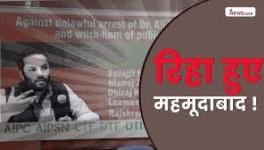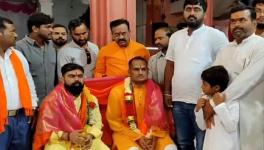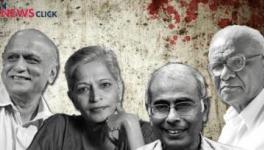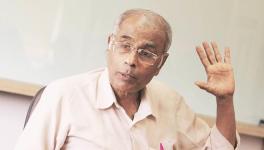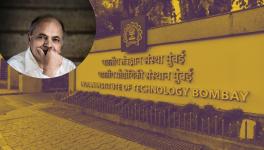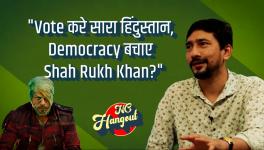In My Own Voice: Being Free
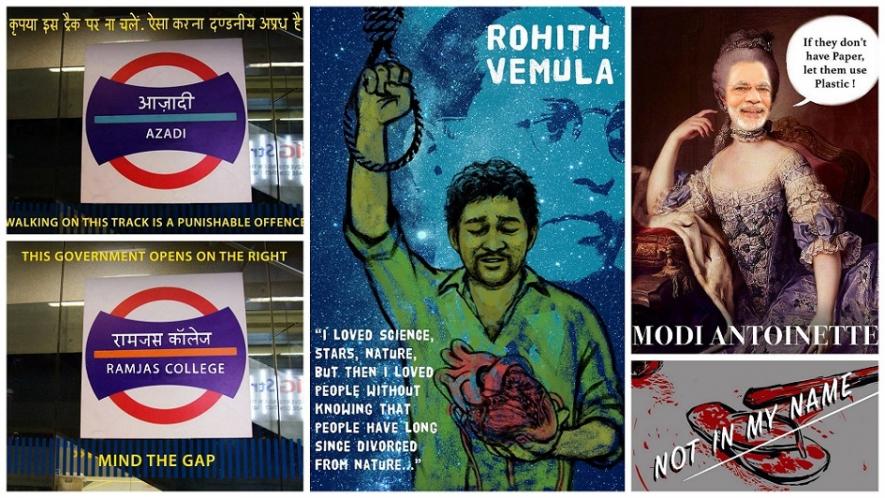
Image Courtesy: Orijit Sen
Some people ask me, ‘What is it that you do?
And when I answer, ‘I write.’
They respond, ‘Just writing?’
It seems baffling to them to spend hours, indeed a lifetime, on something that fetches precious little in this material world obsessed with wealth.
Let me ask you, can you get fish to breathe without gills? For, to a writer, communicating ideas without fear is as essential as the water and air that we breathe. It is this very freedom that is being taken away and, as I write this,130 writers have asked the people of India to vote against the politics of hate and for an equal and diverse India. Earlier, 200 filmmakers had also made an appeal not to vote for the Bharatiya Janata Party.
If you think this is an orchestrated strategy by the Opposition, let me ask you what do writers as diverse as Megha Pansare – whose father in-law Gobind Pansare was killed by Right-wing forces, and the Telugu writer, Volga whose book, ‘The Liberation of Sita’ was awarded the Sahitya Akademi award, have in common? Or the internationally recognised painter, Vivan Sundaram, documentary film-maker, Anand Patwardhan, and playwright Girish Karnad? They speak different languages, express themselves in diverse mediums: words, paint, film, theatre -- are fiercely individualistic -- but are demanding that the precious freedom that we fought for during our freedom struggle and instituted in our Constitution not be taken away.
Our Constitution gives us the freedom to eat, pray, dress, practice our religion and express ourselves without any discrimination. However, the 77 lynchings across the country are terrifying, just about anyone can be picked up by a mob and assaulted.
Take the case of 17-year-old Junaid who was on a train – he was on his way back home after buying new clothes having become a Hafeez (one who has learnt to recite the Quran by heart) -- his mother wept and so did I when she showed me his blood-soaked photograph after being beaten and thrown on a railway station. What hurts me most is that no one in that packed train compartment came to his rescue. He was but a child! Instead, they watched silently as the politics of hate was enacted on his body. His mother says ‘he was too young to know he should not have worn his skull cap’, which speaks volume of how insecure our minorities are today.
The lynching of Mohammad Akhlaq in Dadri village happened when a mob entered his kitchen on the pretext that he was eating beef. The killer, who later died in police custody – no one has alleged torture - had his body draped in tri-colour and Adityanath, the Chief Minister of Uttar Pradesh, at an election campaign speech had the main accused seated in the front row and the other accused, now out on bail, was seen cheering his election speech
These are things that never happened earlier. While it is true that there have been terrible violations of human rights by earlier governments, there is a stark difference when non-state actors or mobs of ordinary citizens take to lynching the minorities. Worse still, when they are shielded by the ruling political dispensation with impunity.
For instance, when rationalists Dabholkar, Kalburgi and Pansare were killed and later, journalist-activist Gauri Lankesh, the police found a link in the country-made gun used and the bullets. The Sanatan Sanstha, now under investigation for these murders, published a book, ‘Shastra Dharm Sadhna’ which seems to have been used as inspiration by the alleged killers. The killing of Lankesh, a bright, vibrant woman in her 50s, who had earlier worked in The Times of India and brought out Gauri Lankesh Patrike independently, brought tears to the eyes of millions of people because she was not speaking against Hinduism, but against Hindutva. Her writings were consistently against superstition and in favour of the ‘Idea of India’.
When she died, I wrote this poem for her and these are some extracts:
For My Sister, Gauri Lankesh
Tonight I write the saddest lines
They killed my sister Gauri last night
…
They sped away on their motorbike
I know they will come again
I do not write these lines in vain;
They killed Kalburgi,
They killed Dabholkar
They killed Pansare
And called it a law and order game….
…
You have electoral power
And the barrel of the gun;
Have your merciless fun;
But in this darkest hour
I will cling to my words
True to my salt;
You killed my sister
Whose only fault
Was to speak and write, fearlessly
Tonight, I write the saddest lines,
You killed my sister, Gauri.
(Full poem published in Mainstream, September 19, 2017)
As I write this, over 600 theatre artistes and practitioners in 12 languages have issued a joint appeal to the people of India to vote out divisive politics from power in the coming Lok Sabha elections. Artistes as diverse as Naseeruddin Shah, Amol Palekar, Atamjit Singh, M.K. Raina and Moloyashree Hashmi have written, “Since colonial times, Indian theatre-makers have celebrated India’s diversity through their work…..Theatre makers in India have a long and proud tradition of standing against forces of religious sectarianism, chauvinism, narrowness and irrationality…. We have over a hundred and fifty years imagined a secular, democratic, inclusive and just India. Today that very idea of India is under threat. Today, song, dance, laughter is under threat. Today, our beloved Constitution is under threat. The institutions that have to nurture argument, debate and dissent have been suffocated. To question, to call out lies, to speak the truth, is branded ‘anti-national’. The seeds of hatred have entered our food, prayers and festivals.”
The statement goes on to say that the coming elections are the most crucial for India. It further states “The BJP which came to power five years ago with promise of development, has given free rein to Hindutva goons to indulge in the politics of hate and violence.”
It ends with an appeal, “vote bigotry, hatred and apathy out of power. Vote against the BJP and its allies… vote for secular, democratic inclusive India. Vote for the freedom to dream. Vote wisely.”
However, I can hear you say, well, I am not a Muslim, dalit, woman or a minority, why should I bother to listen to such appeals from writers and the theatre community?
I ask you to heed the words of Martin Niemoller, a German pastor. Hitler espoused the importance of Christianity to German nationality, leading Niemoller to initially enthusiastically welcome the Third Reich. He later spent six years in Hitler’s concentration camps and wrote:
First, they came for the socialists, and I did not speak out—because I was not a socialist.
Then they came for the trade unionists, and I did not speak out— because I was not a trade unionist.
Then they came for the Jews, and I did not speak out—because I was not a Jew.
Then they came for me—and there was no one left to speak for me.
To you, I say, the future of India and your own safety lies on your index finger.
The writer is an award-winning author and film-director. The views are personal.
Get the latest reports & analysis with people's perspective on Protests, movements & deep analytical videos, discussions of the current affairs in your Telegram app. Subscribe to NewsClick's Telegram channel & get Real-Time updates on stories, as they get published on our website.










